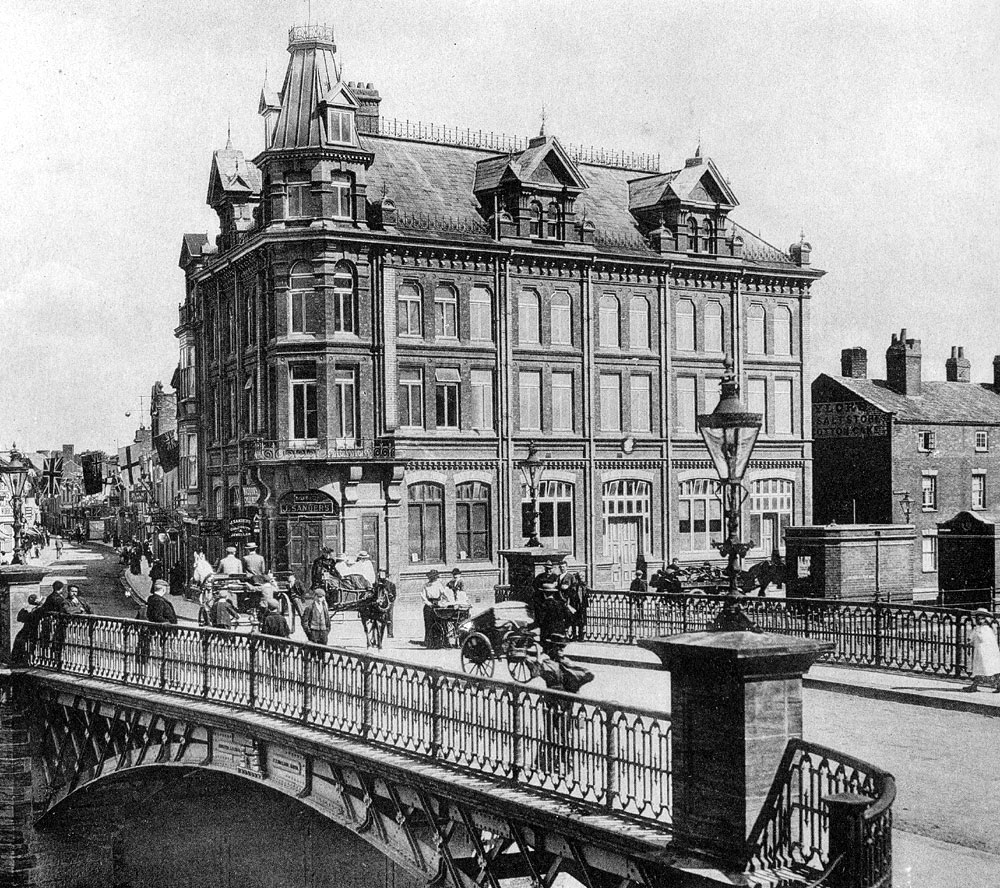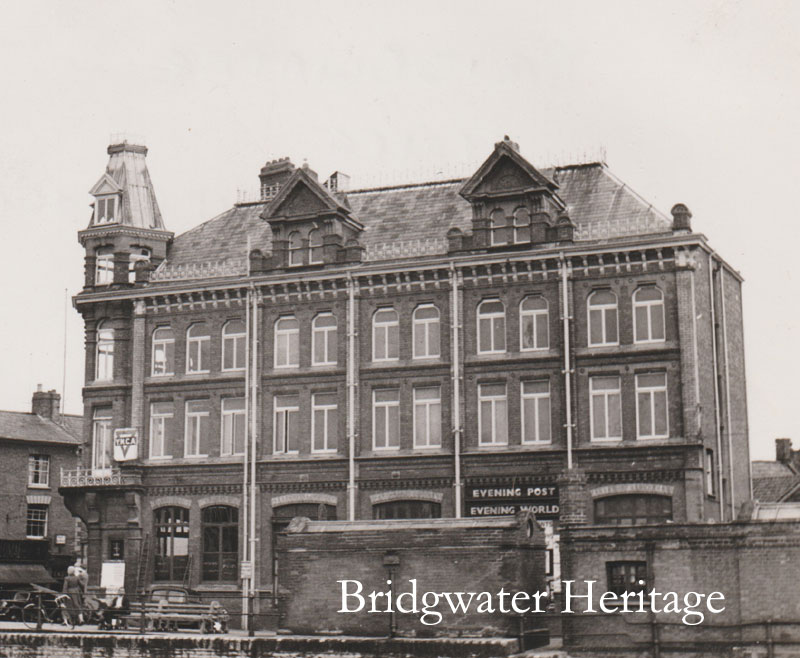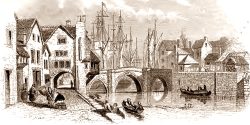
Six foundation stones were laid on 11 September 1886 for the George Williams Memorial Hall, also known as the old YMCA building. It was the home of the Young Men’s Christian Association in Bridgwater, providing a place for activity and accommodation. The stones were laid by local dignitaries, S.J. Stanley M.P.; Elbert Monro, former president of the New York YMCA; J. Storrs Fry, president of the Western District YMCA; Alderman A Peace, Mayor of Bridgwater; Alderman F. J. Thompson, and finally by William Hurman, president of the town’s Young Men’s Christian Association, who later become mayor in 1888. He was presented a silver trowel on the occasion, which can now be seen in the Blake Museum. The ornate building, described as being executed in the classical style ‘freely treated’, was designed by Messrs W. G. Havershood and Fawckner of London, Newport and Cardiff, and built by local builders under H. W Pollard. In all the building cost £3600.
The building was dedicated to the memory of Sir George Williams, the founder of the YMCA. Williams had served as an apprentice draper in Bridgwater during his youth, before moving to London in 1841 and founding the association in 1844. A branch was established in Bridgwater in 1868, which was initially located on the Cornhill. Hurman, who laid one of the foundation stones in Bridgwater, was a draper and connected with William’s time in the town. He had been one of the leaders of the effort to build the hall, which had first been mooted in 1884.
Bridgwater Mercury 16 June 1886
We are informed that Mr. William Hurman has withdrawn his offer to the Corporation of £800 for the Mansion House property in High Street, and that the proposed memorial-hall to Mr. George Williams, founder of the Young Men’s Christian Association, will forthwith be erected on the site of the “Old Globe”, two lots of which were purchased at the auction last week by Mr. Samuel Perrett for this purpose. It is understood the building which will have a frontage towards Eastover and Salmon Parade, will be one of an ornamental character, and consequently prove a very desirable town improvement.
THE OLD GLOBE
It will be remembers that a few months ago the site of the old “Globe” hotel in Eastover, which some years ago was destroyed by fire, and has until now remained a heap of ruins, was purchased by auction by Mr. Head, wine and spirit merchant, for the sum of £1,000. It was hoped that ere this new building would have been provided, by Mr. Head, having retained that potion of the “Globe” premises which was formerly used as an assembly-room, and adjoining those in his own occupation, wisely determined, in his own interests, to offer the remaining portion in three lots. The sale of these took place on Wednesday afternoon last, and was conducted my Mr. C.H. Morris. For the first lot, which consisted of a building site having frontages to Salmon Parade and Eastover, Mr James Leaker started the bidding at £300. It quickly ran up to £430, and was knocked down to Mr. Samuel Perrett for that sum. Mr. Waddon started lot 2, which had a frontage to Eastover, at £250, and this lot was knocked down to Mr. Perrett at £340. For lot 3, which has also a frontage to Eastover, the bidding was hardly so brisk, and the property was secured by Mr H. Jarman for £310. There was a fair attendance at the sale. Mr. W.J.R. Poole acted as solicitor for the vendor. [It is understood that Mr. Perrett purchased the two first lots with a view to the erection on this site of the proposed memorial hall which the Young Men’s Christian Association had in contemplation the erection of in High Street.]
The building was completed a little over a year after the foundation stone was laid, opening on 16 October 1887. The mayor of Bridgwater, Alfred Peace, led a procession from the town hall to the new hall, where they were met by Hurman. He handed a golden key to Mr Creese of Teddington, honorary secretary of the first ever meeting of the YMCA in 1844. He opened the hall, then the dignitaries went into the lecture hall, where a hymn was sung, a prayer given, and a short speech made by Creese. Then George Williams himself gave a speech, remembering his time in Bridgwater.
The hall was built on the location of the old Globe Hotel, which had been destroyed by fire in 1875, the ruins of which had standing derelict for a number of years. The frontage on Eastover extended to 45 feet, with almost double that, 83 feet on Salmon Parade. It was built from Bridgwater brick, with yellow Ham stone dressings and white brick in the piers. The ground floor contained a reading room, library, the office of the secretary, a 130-seat meeting and lecture room, a junior room and gymnasium. Upstairs was a 460-seat lecture room, along with a parlour and a number of class rooms.

The YMCA was ultimately forced to move out of the building as it was too costly for their means. In 1964 the building suffered a fire, which may have prompted the move:
The YMCA at Bridgwater, Somerset, one of the largest buildings in the town, was damaged by fire to-day. It was built as a memorial to the founder of the movement, the late Sir George Williams, a Somerset man, who served his apprenticeship as a draper in Bridgwater. It was opened in 1887 and by a coincidence, was constructed on the site of an inn which had been destroyed by fire 12 years earlier. Liverpool Echo 25 August 1964
TWO-HOUR BLAZE BATTLE AT ‘Y.M.’
Firemen fought a two-hour battle today as a blaze swept part of Bridgwater’s YMCA building. The alarm was given by an auxiliary fireman on his way to work as a postman, who saw smoke pouring from a grocery shop in the building. After breaking in through the main door, firemen used breathing apparatus to get into the offices of the YMCA secretary, Mr David Williams, which were smoked logged. The office and the ceiling of the shop below – occupied by Mrs Heal – were severely damaged, and the shop was damaged by heat, smoke and water. Station Officer Roy Hayman said the fire could have been more serious if all doors in the building had not been closed. Bristol Evening Post 25 August 1964
They moved to a new site by the canal, near St. Matthew’s field in 1967, with a new building being officially opened in 1969. The much-loved older building was demolished in Spring 1968 (Bridgwater Town Guide 1968, page 35). The destruction of this building was one of the greatest losses to the town in the twentieth century.
Sources
Bristol Mercury, 7 October 1887
quibbs’ History of Bridgwater (1982)
Lawrence and Lawrence, A History of Bridgwater (2005)
Fitzhugh, R., Bridgwater and the River Parrett (1993)
